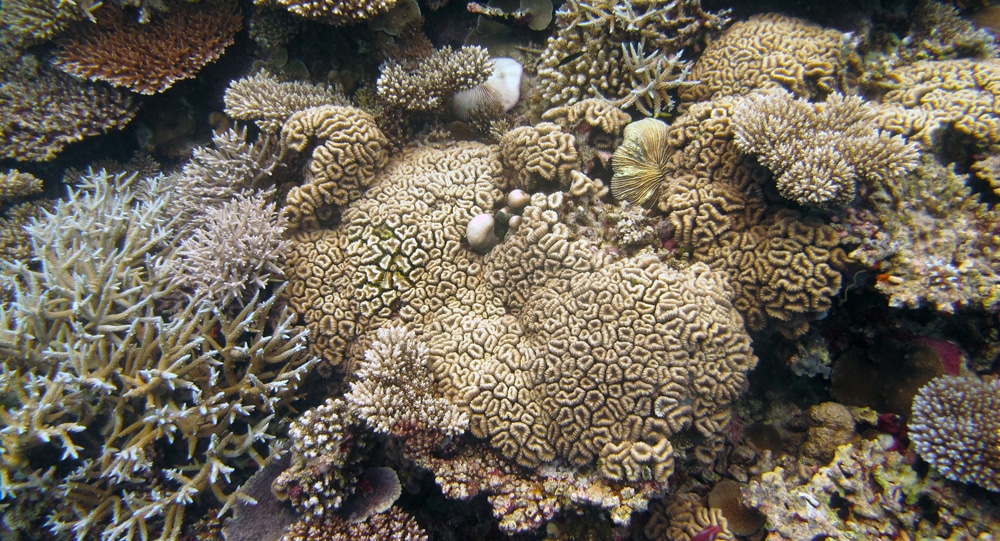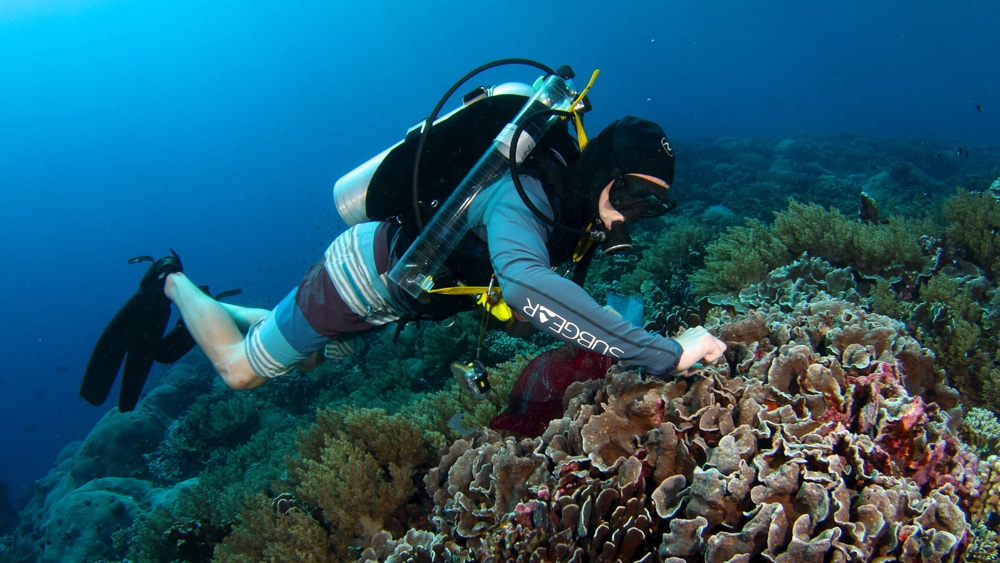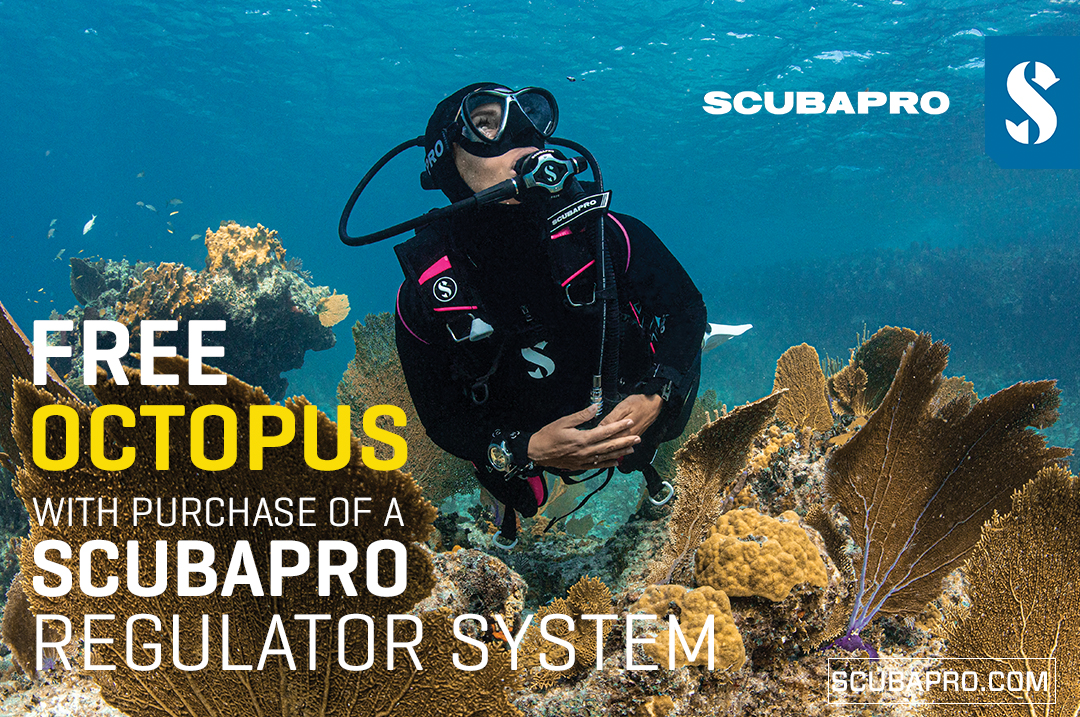News
New study measures how much of corals’ nutrition comes from hunting

When it comes to feeding, corals have a few tricks up their sleeve. Most of their nutrients come from microscopic algae living inside of them, but if those algae aren’t creating enough sustenance, corals can use their tentacles to grab and eat tiny prey swimming nearby.
A new study from researchers at the Woods Hole Oceanographic Institution (WHOI), the University of New Mexico, and Scripps Institution of Oceanography is revealing that more of corals’ nutrients come from this sort of hunting than previously expected, information that may help predict the fate of coral reefs as global ocean temperatures rise. The study published Sept. 17, 2019, in the journal Functional Ecology.
“When you have a heat wave, corals start bleaching. Symbiotic algae, which live inside corals and provide them with most of their nutrients, are expelled from their body. If corals stay bleached for too long they basically starve to death,” says Michael Fox, a postdoctoral scholar at WHOI and lead author on the paper. “But if a coral has the opportunity to eat a lot before it bleaches or while it is bleached, it can survive off its fat stores long enough to regain those symbionts when water temperatures cool off. If we can better understand when, where, or why corals are eating, we may be able to understand why they survive better in some places than others during future bleaching events.”
Corals

Michael Fox, WHOI postdoctoral scholar and lead author of the study, sampling coral on Pulo Anna Island, Palau. Photo courtesy of Brian Zgliczynski
Fox and his colleagues conducted their study from samples they collected at Palmyra Atoll, a remote US national wildlife refuge in the central Pacific Ocean. After bringing them back into the lab, the researchers removed the coral polyps from their skeletons, and then separated the coral animals and their symbiotic algae in a centrifuge. The team then extracted essential amino acids from the corals, their symbionts, and the tiny zooplankton that corals often eat.
“Essential amino acids are required for an animal to survive, but most corals can’t make them. They have to get them from either their symbionts or something they just ate,” says Fox. “But each of those sources make amino acids in different ways, which gives the molecules distinct chemical signatures.”
Those signatures can be used to “fingerprint” the source of the amino acid, he adds. By measuring chemical differences in six individual amino acids, the researchers were able to determine how much of a coral’s nutrition was coming from symbionts, or from captured prey. This new method for measuring coral nutrition allows scientists to estimate the contributions of different food sources to coral diets, providing a more accurate view of their nutrition than previous methods. The technique was co-developed by animal ecologist Seth Newsome of the University of New Mexico, who is also a co-author on the study.
“To my knowledge, this has never been done with corals before. It really changed our perspective,” says Fox. “Our findings suggest that some corals are eating a lot more than we previously thought, which has big implications for reef survival during climate change. We’ve also learned that individual corals of the same species can have very different diets—this may be an important source of variation that we’ll have to take into account to understand how corals will respond to future changes.”
For more information about the work of the WHOI please visit their website by clicking here.
News
Dive Worldwide Announces Bite-Back as its Charity of the Year

Over the next 12 months, specialist scuba holiday company Dive Worldwide will be supporting Bite-Back Shark & Marine Conservation with donations collected from client bookings to any one of its stunning dive destinations around the world. The independently-owned operator expects to raise £3000 for the UK charity.
Manager at Dive Worldwide, Phil North, said: “We’re especially excited to work with Bite-Back and support its intelligent, creative and results-driven campaigns to end the UK trade in shark products and prompt a change in attitudes to the ocean’s most maligned inhabitant.”
Bite-Back is running campaigns to hold the media to account on the way it reports shark news along with a brand new nationwide education programme. Last year the charity was credited for spearheading a UK ban on the import and export of shark fins.
Campaign director at Bite-Back, Graham Buckingham, said: “We’re enormously grateful to Dive Worldwide for choosing to support Bite-Back. The company’s commitment to conservation helps set it apart from other tour operators and we’re certain its clients admire and respect that policy. For us, the affiliation is huge and helps us look to the future with confidence we can deliver against key conservation programmes.”
To launch the fundraising initiative, Phil North presented Graham Buckingham with a cheque for £1,000.
Visit Dive Worldwide to discover its diverse range of international scuba adventures and visit Bite-Back to learn more about the charity’s campaigns.
MORE INFORMATION
Call Graham Buckingham on 07810 454 266 or email graham@bite-back.com
Gear News
Scubapro Free Octopus Promotion 2024

Free Octopus with every purchase of a SCUBAPRO regulator system
Just in time for the spring season, divers can save money with the FREE OCTOPUS SPRING PROMOTION! Until July 31st SCUBAPRO offers an Octopus for free
with every purchase of a regulator system!
Get a free S270 OCTOPUS with purchase of these combinations:
MK25 EVO or MK19 EVO with A700
MK25 EVO or MK19 EVO with S620Ti
MK25 EVO or MK19 EVO with D420
MK25 EVO Din mit S620Ti-X
Get a free R105 OCTOPUS with purchase of the following combinations:
MK25 EVO or MK19 EVO with G260
MK25 EVO or MK17 EVO with S600
SCUBAPRO offers a 30-year first owner warranty on all regulators, with a revision period of two years or 100 dives. All SCUBAPRO regulators are of course certified according to the new European test standard EN250-2014.
Available at participating SCUBAPRO dealers. Promotion may not be available in all regions. Find an authorized SCUBAPRO Dealer at scubapro.com.
More information available on www.scubapro.com.
-

 News3 months ago
News3 months agoHone your underwater photography skills with Alphamarine Photography at Red Sea Diving Safari in March
-

 News3 months ago
News3 months agoCapturing Critters in Lembeh Underwater Photography Workshop 2024: Event Roundup
-

 Marine Life & Conservation Blogs3 months ago
Marine Life & Conservation Blogs3 months agoCreature Feature: Swell Sharks
-

 Blogs2 months ago
Blogs2 months agoMurex Resorts: Passport to Paradise!
-

 Blogs2 months ago
Blogs2 months agoDiver Discovering Whale Skeletons Beneath Ice Judged World’s Best Underwater Photograph
-

 Gear Reviews3 weeks ago
Gear Reviews3 weeks agoGEAR REVIEW – Revolutionising Diving Comfort: The Sharkskin T2 Chillproof Suit
-

 Marine Life & Conservation2 months ago
Marine Life & Conservation2 months agoSave the Manatee Club launches brand new webcams at Silver Springs State Park, Florida
-

 Gear Reviews3 months ago
Gear Reviews3 months agoGear Review: Oceanic+ Dive Housing for iPhone
















